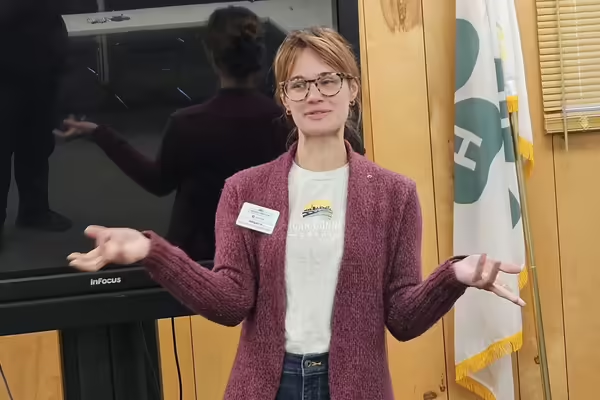
LEWISTOWN, Ill. - No matter the size of the community, there are always projects that need addressed. And many times, those projects are also in need of funding sources. A recent meeting facilitated by University of Illinois Extension helped community leaders connect with three state funding sources.
“As I work with our local government leaders, a common situation that comes up is the fact that many communities are not aware of all of the state’s grant programs,” explained Richard Proffer, Illinois Extension community and economic development educator. “I wanted to plan an event where rural town leaders could learn about the grant opportunities in an approachable format and take away practical information to help their communities.”
On February 18, the Rural Town Leader Funding meeting included presenters from the three largest state funding organizations: Department of Commerce and Economic Opportunity, Climate and Equitable Jobs Act, and Illinois Office of Broadband. Nineteen rural community leaders representing eight towns and organizations, ranging from Bath to Canton, attended.
The presentations were tailored to the rural community audience to increase the practical takeaways for the leaders. DCEO’s North Central Regional Managers, Lauren Gibson and Mark Adams, talked about their programs aimed at total community and economic development. The topics included loans, grants, tax credits, incentives, workforce development programs, grocery store incentives, and small business development programs.
CEJA talked about the energy transition community grant. Matthew Swaine, CEJA grants manager, explained how this program came about and who could qualify (everyone in the room qualified, yet very few knew about it); the grant is based on the closing of coal mines and plants and is designed to ease the economic stress those closures created.
Lead for America Fellow Abi Amstutz-Spencer represented Illinois Office of Broadband. She talked about the state’s broadband programs along with her community work.
Bath Village Trustee Merritt Pratt shared with Proffer, “Why did we not know this before today?”
“You were right, Richard, we did not know what we were missing out on,” stated Jerad Schier, Manito Village Trustee.
There were attendees from outside Fulton, Mason, Peoria, and Tazewell counties who were referred by one of the state agencies. Also, Economic Development and Infrastructure Project Leader Mark Slover, representing State Representative Travis Weaver, was in attendance.
The response from the meeting is a testament to the hunger for this type of information. One school district has applied for some of the broadband and CEJA grants. Three leaders took the information back to their town councils for review, to decide how best to proceed as a group.
PHOTO CAPTION
Abi Amstutz-Spencer, Lead for America fellow, represented Illinois Office of Broadband at a recent Rural Town Leader Funding meeting held in Fulton County. State funding organizations presented to 19 attendees with the goal of bringing more awareness to funding sources available for community development needs.
University of Illinois Extension develops educational programs, extends knowledge, and builds partnerships to support people, communities, and their environments as part of the state's land-grant institution. Extension serves as the leading public outreach effort for University of Illinois Urbana-Champaign and the College of Agricultural, Consumer and Environmental Sciences in all 102 Illinois counties through a network of 27 multi-county units and over 700 staff statewide. Extension’s mission is responsive to eight strategic priorities — community, economy, environment, food and agriculture, health, partnerships, technology and discovery, and workforce excellence — that are served through six program areas — 4-H youth development, agriculture and agribusiness, community and economic development, family and consumer science, integrated health disparities, and natural resources, environment, and energy.